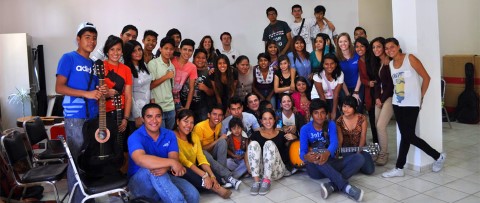- Team Impact
- Dominican Republic
Empowering young leaders.
Transforming futures.
Transforming futures.

Growing up in the destitute neighborhoods of Guadalajara, Mexico, is not easy.
As the program officer for youth development and education, I recently traveled to our Guadalajara field office to meet with the Youth Council leaders. During our meeting, the youth shared the daily struggles they face at home and in their communities, such as young people drinking and getting high on the streets, gang members looking for recruits, long distances to high school, lack of positive role models, and working while going to school and helping at home. And the list continues …
They are faced with difficult situations and decisions on a daily basis, challenges you never would have guessed upon meeting the youth who participate in the programs in our Guadalajara field office. Instead, the youth seem energetic, polite and well-spoken.
As we discussed these issues, I could see what a remarkable outlet CI gives to these youth. They seek refuge in our community centers and the programs offered to them — education support, computer courses, leadership training, volunteer opportunities, Youth Health Corps and sports programming. On Saturdays, our centers are overflowing with youth who want to participate in the variety of activities taking place — primarily the Youth Leadership Training program.

This powerful program, taught with the co-branded CI and Peace Corps “Youth Leadership Training Through Program Design and Management Manual,” enhances leadership skills such as communication, conflict resolution and teamwork, while also teaching how to critically analyze problems in communities and generate solutions. The youth learn to carry out projects from the needs assessment stage to the evaluation of the outcomes.
After weekly Youth Leadership trainings, the youth also participate in arts activities, such as theater, dance, circus skills, music and costume and mask-making. These activities are led by key youth leaders and designed to increase participation in the program.
The youth are powerful leaders within their communities and can incite major changes. They just have to believe in themselves.
These days, the youth are ready, willing and excited to make these changes a reality. However, this was not always the case. Several of the CI-Jalisco staff members described how much the youth have grown, learned and improved over the last few years since the program began. The youth used to be disinterested and unorganized … now they have transformed into mature leaders.
During my time with them, I encouraged the Youth Council leaders to continue to think of ways to overcome their daily struggles — solutions they can implement through their annual grant funding.
In 2014, there is even more youth participation at the CI-Jalisco community centers. These young people are making real changes in themselves, in their families and in their communities.